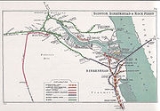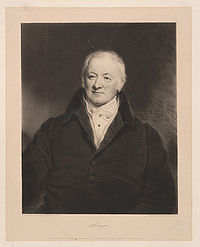
Fouldes v Willoughby
Encyclopedia
Fouldes v Willoughby 8 M&W 540 is a leading English law
case on the tort
of conversion
.
to Liverpool
. The ferryman refused to carry the horses. The owner refused to take them back on shore, and so the ferryman took the bridle
from the owner turned the horses loose at the landing. The owner stayed put on board, and did not try to get the horses back. He sued the ferryman for conversion.
The judge at the trial told the jury that the defendant ferryman, by taking the horses from the plaintiff and turning them out of the vessel, had been guilty of a conversion. The ferryman appealed.
 The Exchequer Court held that the ferryman was not guilty of conversion, because there was no interference with the plaintiff's "general right of domination" over the horses. “In my opinion,” said Lord Abinger CJ,
The Exchequer Court held that the ferryman was not guilty of conversion, because there was no interference with the plaintiff's "general right of domination" over the horses. “In my opinion,” said Lord Abinger CJ,
Rolfe B gave a now well recognised definition of conversion that it is,
Instead, the ferryman was liable for trespass
.
English law
English law is the legal system of England and Wales, and is the basis of common law legal systems used in most Commonwealth countries and the United States except Louisiana...
case on the tort
Tort
A tort, in common law jurisdictions, is a wrong that involves a breach of a civil duty owed to someone else. It is differentiated from a crime, which involves a breach of a duty owed to society in general...
of conversion
Conversion (law)
Conversion is a common law tort. A conversion is a voluntary act by one person inconsistent with the ownership rights of another. It is a tort of strict liability...
.
Facts
The owner of two horses had come on board a ferry from BirkenheadBirkenhead
Birkenhead is a town within the Metropolitan Borough of Wirral in Merseyside, England. It is on the Wirral Peninsula, along the west bank of the River Mersey, opposite the city of Liverpool...
to Liverpool
Liverpool
Liverpool is a city and metropolitan borough of Merseyside, England, along the eastern side of the Mersey Estuary. It was founded as a borough in 1207 and was granted city status in 1880...
. The ferryman refused to carry the horses. The owner refused to take them back on shore, and so the ferryman took the bridle
Bridle
A bridle is a piece of equipment used to direct a horse. As defined in the Oxford English Dictionary, the "bridle" includes both the headstall that holds a bit that goes in the mouth of a horse, and the reins that are attached to the bit....
from the owner turned the horses loose at the landing. The owner stayed put on board, and did not try to get the horses back. He sued the ferryman for conversion.
The judge at the trial told the jury that the defendant ferryman, by taking the horses from the plaintiff and turning them out of the vessel, had been guilty of a conversion. The ferryman appealed.
Judgment

“he should have added to his direction, that it was for them to consider what was the intention of the defendant in so doing. It is a proposition familiar to all lawyers, that a simple asportation of a chattel, without any intention of making any further use of it, although it may be a sufficient foundation for an action of trespass, is not sufficient to establish a conversion. It has never yet been held that the single act of removal of a chattel, independent of any claim over it, either in favour of the party himself or any one else, amounts to a conversion of the chattel.”
Rolfe B gave a now well recognised definition of conversion that it is,
"a taking with the intent of exercising over the chattel an ownership inconsistent with the real owner's right of possession".
Instead, the ferryman was liable for trespass
Trespass in English law
Trespass in English law is an area of tort law broadly divided into three groups: trespass to the person, trespass to goods and trespass to land...
.

